Sarah Sundin's Blog, page 531
February 24, 2011
Today in World War II History
70 Years Ago—Feb. 24, 1941: Near El Agheila, Libya, British and German troops skirmish for first time in North Africa.
Published on February 24, 2011 03:00
February 23, 2011
Book Club Beat - Lost Mission by Athol Dickson
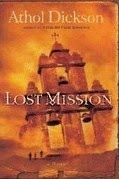 Book club name and/or location: Bibliovores, northern California
Book club name and/or location: Bibliovores, northern CaliforniaTitle and Author: Lost Mission by Athol Dickson
What it's about:
Buried beneath the poverty-stricken barrios and wealthy enclaves of Southern California, a Spanish mission is uncovered during a construction project—along with evidence of a crime. When four people begin work on unraveling the mystery, they each face a moral dilemma. Will their choices perpetuate the very crime that doomed the mission hundreds of years before?
Were discussion questions available? Were they helpful?
Yes, in the back of the book. They were helpful, but discussion flowed so we didn't have to use many.
What we liked about the book:
As always, Athol Dickson pens a beautifully written novel. We liked the rich parallels between the contemporary storyline and the storyline set in Spanish California, and the message about the twin dangers for Christians—to live too much "in the world" or to live too much "out of the world." Also, the author's choice to have some Catholic main characters and to look at illegal immigration from a fresh perspective impressed us.
Anything we would change about the book?
Most of us took some time getting into the book and figuring out the flow of the storyline. Some felt the transitions between the two storylines weren't clearly delineated. Also, this novel is written in the style of "magical realism," and not everyone liked the magical/miraculous aspects of the book—but others did.
Fun connections (did the story inspire food, decorations, favors, service projects, etc.)?
To honor the story's Mexican and Spanish California flavor, we ate enchiladas and Mexican-inspired bean salad and corn salad. We also complimented the hostess on how her napkins and placemats coordinated with the book cover.
Deep connections (this story made us think about the following discussion topics):
We discussed illegal immigration and what it means to follow Jesus' command to live "in the world but not of it." We talked about how easy it is to start off with good, godly intentions and veer into something dangerous if we aren't vigilant. This book sparked very interesting conversation.
Do you recommend this book for other book clubs?
Yes, but only if your book club likes a more difficult read that challenges assumptions Christians easily make—and a book not everyone will get into. This is not a beach read.
If you belong to a book club and would like your group to be featured on this blog, let me know! Pictures of the book club can be included if you'd like. Christian or "clean secular" fiction/nonfiction only please. The questionnaire is short, and I'll obtain the book cover and story blurb.
If you're looking for a book club, check out the Book Club Network at http://www.bookfun.org/ , an on-line meeting place for Christian book club members and authors. Over 800 members and it's only a few months old! Join the fun!
Published on February 23, 2011 05:00
February 21, 2011
Pharmacy in World War II
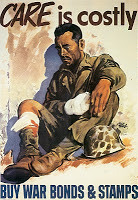 As a pharmacist and a World War II buff, naturally I'm interested in how pharmacy was practiced during the war. Last week I was a guest blogger on Jordyn's Medical Edge, a blog which provides medical facts for fiction writers, with a three-part series about pharmacy in World War II.
As a pharmacist and a World War II buff, naturally I'm interested in how pharmacy was practiced during the war. Last week I was a guest blogger on Jordyn's Medical Edge, a blog which provides medical facts for fiction writers, with a three-part series about pharmacy in World War II.The first post covered the general practice of pharmacy - some basic facts about the profession at the time, and education and licensing. I also looked at how the wartime manpower shortage affected the profession, and how shortages and rationing affected both the drugstore and compounding. http://www.jordynredwood.com/2011/02/pharmacy-in-world-war-iithe-pharmacist.html.
The second post was a virtual tour of the local drugstore--first in 1939 before the war, then in 1943 to see how the war affected this cornerstone of American life. http://www.jordynredwood.com/2011/02/pharmacy-in-world-war-iithe-drug-store.html.
In the third post I researched a little mystery that plagued me while researching the military health care system for my novels. I read about physicians, nurses, dentists, veterinarians...but where were the pharmacists? Here is what I learned. As a pharmacist, I have to admit, I was steamed. http://www.jordynredwood.com/2011/02/pharmacy-in-world-war-iithe-military.html. Pharmacists have always served a quiet role in the health care system, but a necessary one. Hug a pharmacist today!
Published on February 21, 2011 07:32
February 19, 2011
Today in World War II History
70 Years Ago—Feb. 19, 1941: Luftwaffe switches focus from attacking London to attacking shipping centers, such as Portsmouth, Plymouth, Bristol, and Cardiff.
Published on February 19, 2011 03:00
February 18, 2011
In a Big Way
 Zacchaeus might have been a small man, but he did everything in a big way.
Zacchaeus might have been a small man, but he did everything in a big way.He Sinned Big
Zacchaeus, though a Jew, worked for the occupying Roman government. A collaborator. A tax collector who took extra for himself. This was allowed by Roman law, but broke God's law. As chief tax collector, he was successful and wealthy—and hated by the citizens of Jericho.
He Sought Big
All that money and prestige didn't fill Zacchaeus's needs. When he heard Jesus was coming to Jericho, he longed to hear the traveling teacher and healer. Luke 19:4 says Zacchaeus ran ahead and climbed a sycamore-fig tree. He ran ahead. He didn't get lost in the crowd and climb the tree to see above—he planned ahead. More than anything, Zacchaeus wanted to see Jesus.
He Repented Big
Jesus' request to dine at Zacchaeus's house and the conversation they had changed Zacchaeus's heart. He didn't just ask God for forgiveness. He offered to pay back four times what he'd stolen, which fulfilled Jewish law. In addition, he gave away half his possessions to the poor. He'd found greater riches in the Lord.
We may or may not have sinned in such a way that we're hated by others, but we can all follow Zacchaeus's example by seeking Jesus in a big way every day, and by living big for Jesus.
Published on February 18, 2011 05:00
February 16, 2011
Book Club Beat - Hurricanes in Paradise by Denise Hildreth
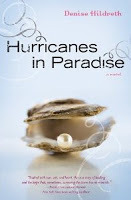 Welcome to Book Club Beat, where book clubs share about their discussions. Today I have a special guest, Nora St. Laurent. In addition to running two "live" book clubs, Nora also coordinates the ACFW (American Christian Fiction Writers) on-line book club, plus The Book Club Network, an on-line community for book club leaders, book club members, and authors (http://www.bookfun.org/).
Welcome to Book Club Beat, where book clubs share about their discussions. Today I have a special guest, Nora St. Laurent. In addition to running two "live" book clubs, Nora also coordinates the ACFW (American Christian Fiction Writers) on-line book club, plus The Book Club Network, an on-line community for book club leaders, book club members, and authors (http://www.bookfun.org/). Welcome, Nora! Please tell us about your book club meeting.
Book club name and/or location:
The name of my book club is Finding Hope Book Club. I run two book clubs that meet inside the Christian store I work at in Atlanta, Georgia. One meets on the fourth Monday and the other meets the fourth Tuesday of the month. We meet from 7-9 pm in the back of the store.
When authors speak live at the store, I combine the clubs and meet on Monday night so everyone can meet the author.
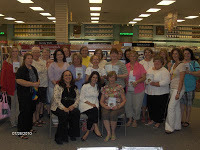
Title and Author: Hurricanes in Paradise by Denise Hildreth.
What It's About:
When Riley Sinclair stepped into her new job as director of guest relations at a posh resort on Paradise Island, she felt the final pieces of her once-broken life coming together. But the waters become choppy when Riley discovers that some who come to the Atlantis Hotel are accompanied by paralyzing secrets and overwhelming fears. Riley and three guests are in desperate but unknowing need of each other, eventually forging unlikely yet powerful friendships. With a hurricane headed straight for the island, together they embark on a journey of laughter, heartache, and healing.
Were discussion questions available? Were they helpful?
I did use several discussion questions in the back of the book. Denise has twelve of them with a variety of topics. They were very good questions.
Since my book club meets in the middle of a book store, I try not to talk about really personal things but talk about the characters. Most of Denise's questions stuck to the characters and the story so I used many of them.
Just as I was about to start the meeting, I noticed Denise Hildreth walk through the front door. I had asked her to be there at 7:30 pm to give us time to talk about the book before she arrived. Denise sat down among the ladies and asked if it was okay for her to listen. I wasn't going to say no but I became self conscious. Even though this was my second time meeting Denise, I still felt uneasy sharing the few personal things I was going to share with the group. I fumbled through what I was going to say and asked discussion questions of my group. My ladies responded like Denise had been a book club member all along.
What we liked about the book:
I have a variety of age groups in both book clubs, from teens to grandmothers, so we enjoyed the diversity of ladies in the story. Denise has several quirky characters who wouldn't have met if they weren't stuck at Paradise Hotel during a hurricane. We loved how the characters responded to each other.
Anything we would change about the book?
Yes, several of my ladies and I felt one of the characters did not have to die. I won't name names. But we were all heartbroken.
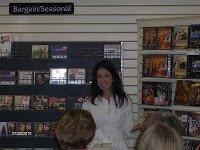
Fun connections (did the story inspire food, decorations, favors, service projects, etc.? Did you have an author visit or phone call?):
We had a visit by author Denise Hildreth. After the discussion, Denise got up to speak. I saw tears in her eyes. She was touched by what the ladies shared. Denise had never planned on being a writer. She wanted to be a singer but she was obedient to the call. She said, "God doesn't need me to get His message across to His people. I'm humbled that He has used me in a small way to touch your lives."
She spoke to the group about her testimony and what had happened in her life since the last time we met. It was powerful. She was so transparent and honest! I love that about her.
Deep connections (this story made us think about the following discussion topics):
This book was a big hit with my members. We needed more than thirty minutes to discuss this book.
I loved what Denise said in the book about her characters and their struggles. "These women face real-life struggles. Real-life heartache that many of us face every day…this is a story about learning to live. My hope is that as you close the pages, you will be more aware of what real living is all about, more aware that inside your soul is the ability to survive even the toughest storms."
I couldn't agree with her more. Denise's book touched my heart and soul. I enjoyed these ladies. I laughed. I was surprised at what the characters shared, and my spirit was moved as they faced their fears. Finding Hope Book Club LOVED this book!
Do you recommend this book for other book clubs?
Yes, I highly recommend this book for a book club discussion.
Thanks, Nora, for sharing about your book club meeting with us! Sounds like a lot of fun.
If you belong to a book club and would like your group to be featured on this blog, let me know! Pictures of the book club can be included if you'd like. Christian or "clean secular" fiction/nonfiction only please. The questionnaire is short, and I'll obtain the book cover and story blurb.
If you're looking for a book club, check out the Book Club Network at http://www.bookfun.org/ , an on-line meeting place for Christian book club members and authors. Over 800 members and it's only a few months old! Join the fun!
Published on February 16, 2011 05:00
Today in World War II History
70 Years Ago—Feb. 16, 1941: Sulfanilamide recommended as treatment for trachoma.
Published on February 16, 2011 03:00
February 15, 2011
Today in World War II History
70 Years Ago—Feb. 15, 1941: Norwegian Lutheran bishops denounce Nazi brutality.
Published on February 15, 2011 03:00
February 14, 2011
Love Letters and Victory Mail
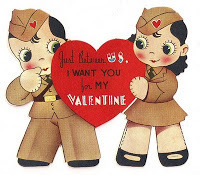 There's nothing like a love letter. When you write one, you dwell on the qualities you adore in the person you love. When you receive one, you feel warm and gooey inside.
There's nothing like a love letter. When you write one, you dwell on the qualities you adore in the person you love. When you receive one, you feel warm and gooey inside.Letters in World War II
During World War II, letters were more than romantic—they were essential to the health of a relationship. Soldiers and sailors who shipped overseas couldn't make phone calls, and of course, e-mails and text messages hadn't been invented. That left letters.
The average soldier wrote six letters a week. Those letters took anywhere from 1-4 weeks to cross the ocean to the United States. Each letter received at home assured loved ones that their serviceman was still alive and well when he wrote that letter. And each letter received on the front reminded that serviceman why he was fighting.
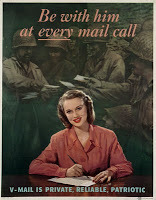
Victory Mail
The US military knew that letters from home were the single biggest morale booster, and a force with high morale fights better. However, mail bags took up valuable space on cargo ships and planes. For example, in 1945 the US Army handled over 2 billion pieces of mail.
The solution was Victory Mail, or V-Mail. Letters written on pre-printed forms were photographed and reproduced onto microfilm. The rolls of microfilm were transported overseas, where the letters were printed again at one-quarter size and mailed to their destination.
V-Mail was never mandatory, but it was successful. A letter on microfilm took up about one-thirty-seventh of the space of the same letter on paper. In the first two years of the program, the military estimated that V-Mail saved room for 5 million pounds of cargo.
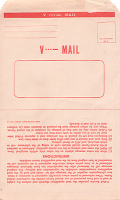
V-Mail Stationery
V-Mail stationery was a single page, printed front and back. The back contained instructions as well as space for return and mailing addresses. The letter was written on the front within the margins, boldly and in dark ink so it would reproduce well. The return and mailing addresses were repeated at the top. The form was folded in half, sealed, and sent off.
At the V-Mail processing center, each letter was censored and photographed. The original letters were stored until confirmation was received that the shipment had been received—a nice insurance policy in case a cargo ship was sunk by a U-boat or a cargo plane went down in bad weather.
V-Mail had its disadvantages. Letters had to be short. No enclosures were possible. The scent of perfume did not photograph. And lipstick prints gummed up the scanning machines—dubbed the "Scarlet Scourge" by postal workers.

Still Victory mail and regular letters helped couples communicate. The danger of wartime lent urgency to correspondence. No one knew if that letter was the last one they'd write or receive. Couples regularly expressed feelings usually saved for special occasions.
My source for this post was the excellent on-line display on V-Mail at the Smithsonian Postal Museum: http://www.postalmuseum.si.edu/VictoryMail
Write a love letter today!
We may not face the same danger today, but our marriages can still benefit from a sweetly written love letter.
Happy Valentine's Day!
Published on February 14, 2011 09:51
Today in World War II History
70 Years Ago—Feb. 14, 1941: Bulgaria grants Germany access to its border with Greece. USSR names Gen. Georgi Zhukov chief of general staff and deputy commissar of defense. First German Afrika Korps troops arrive in Tripoli, Libya.
Published on February 14, 2011 03:00



